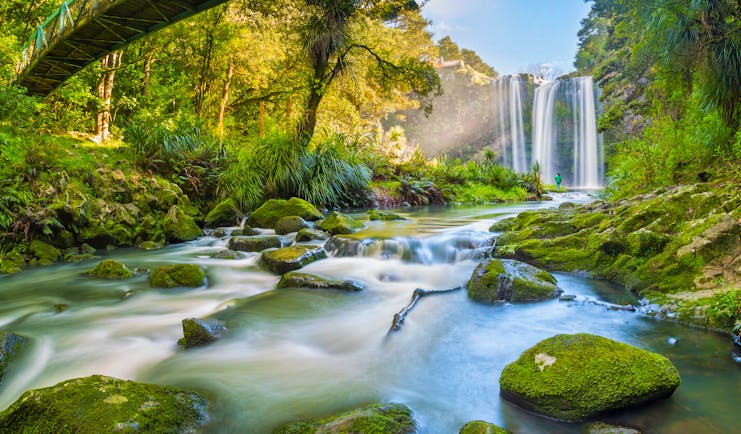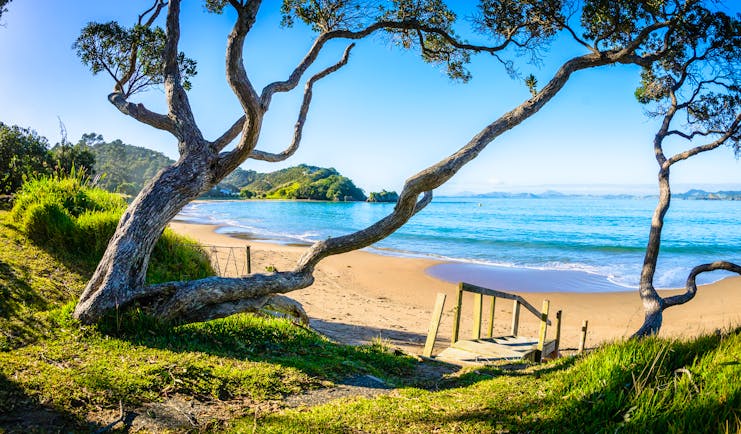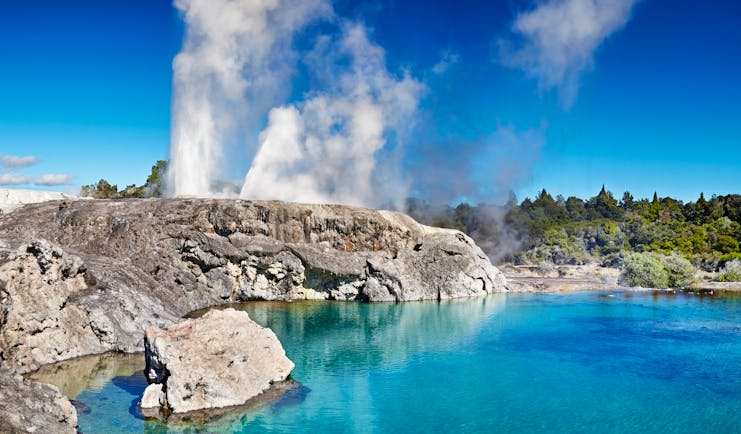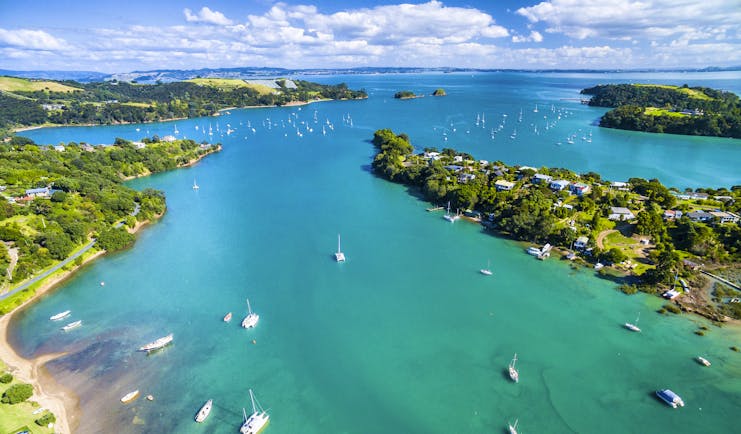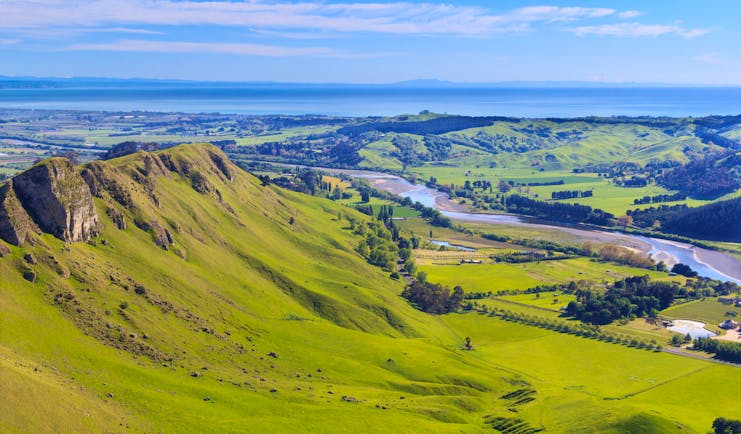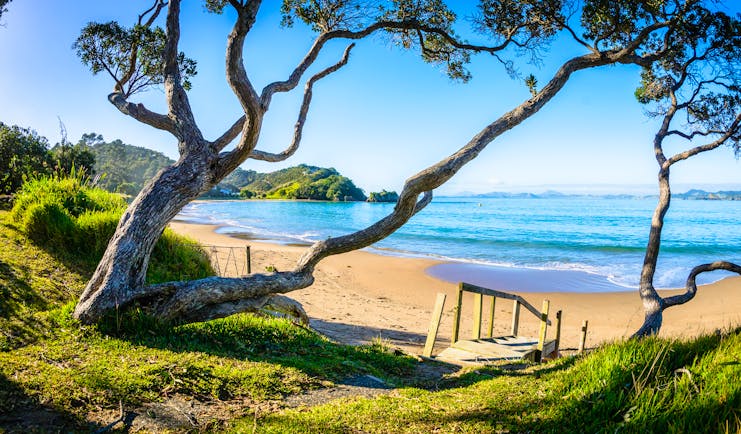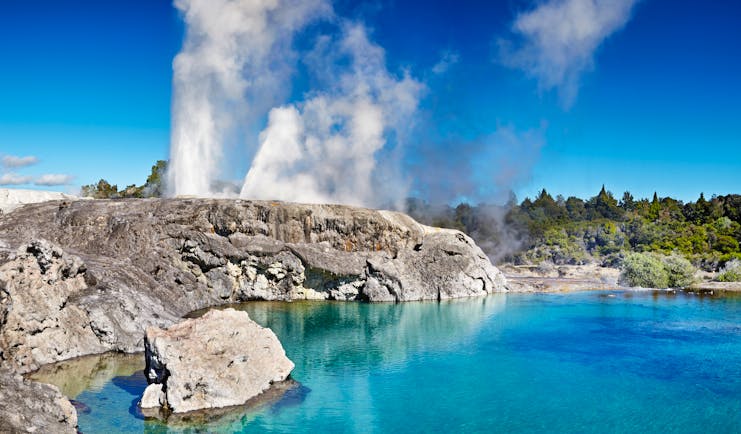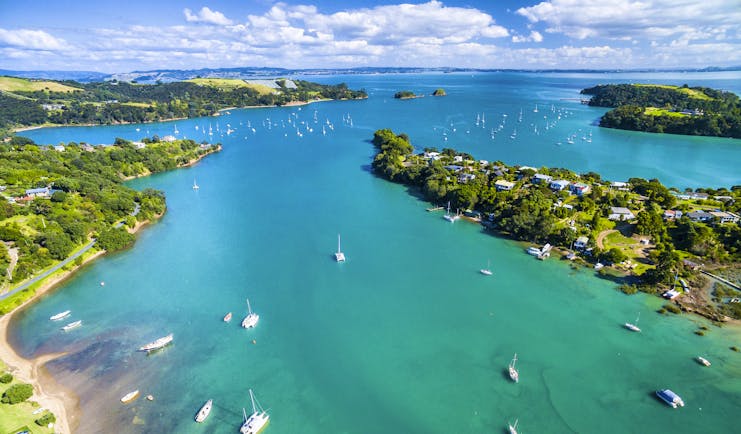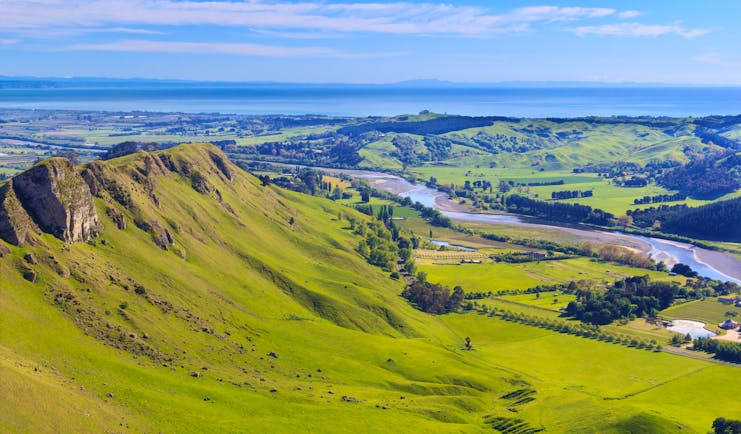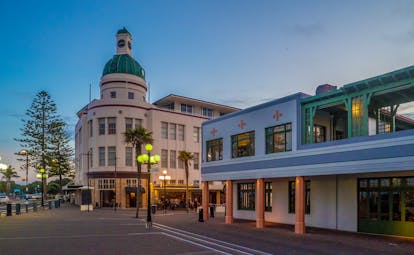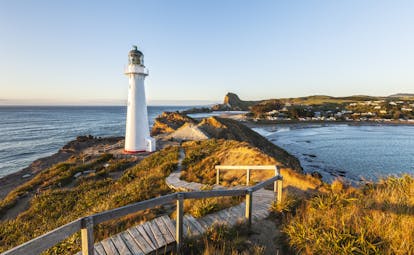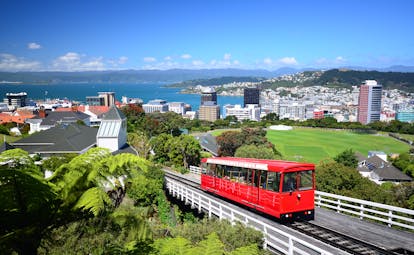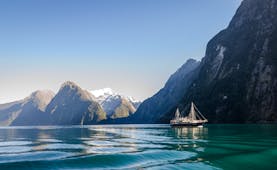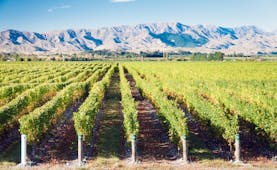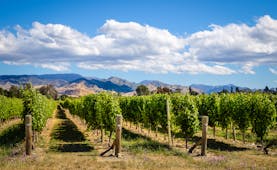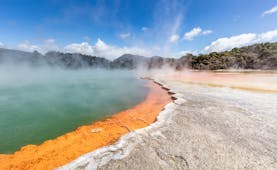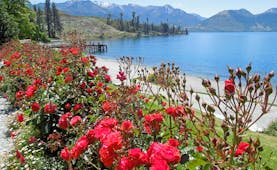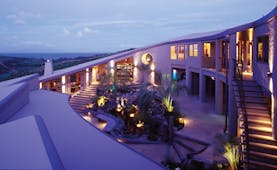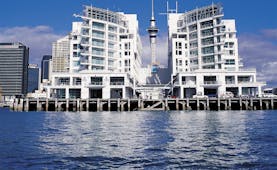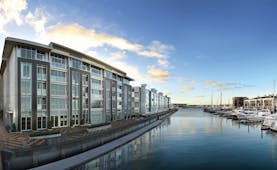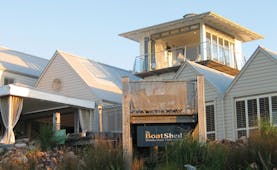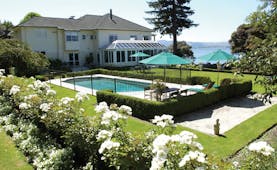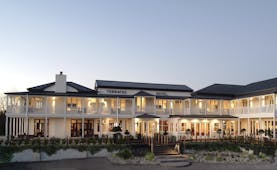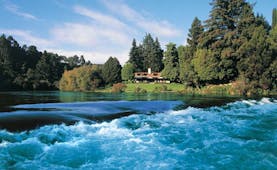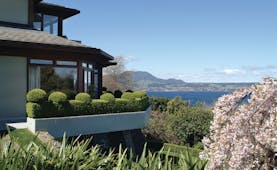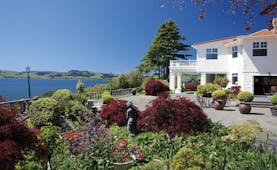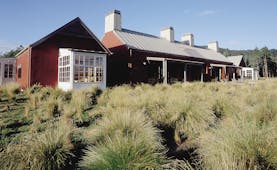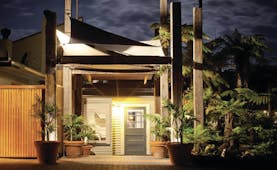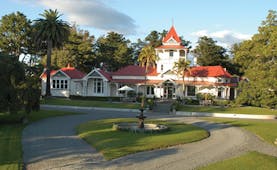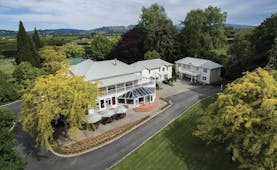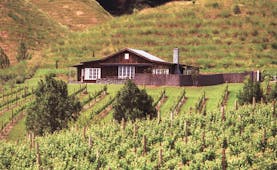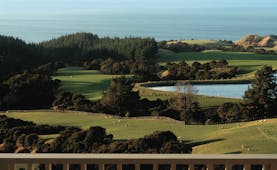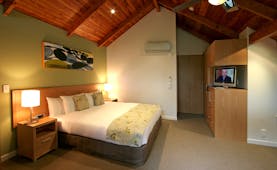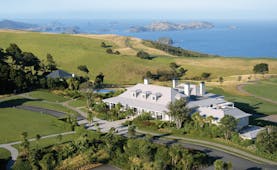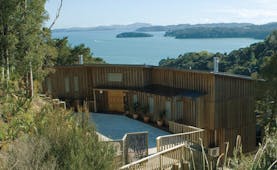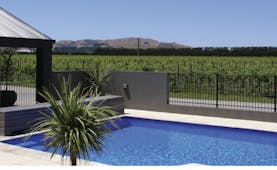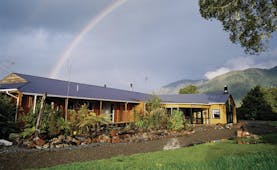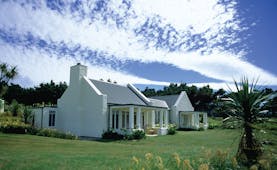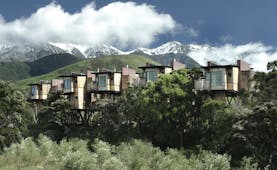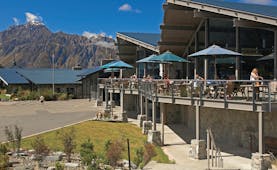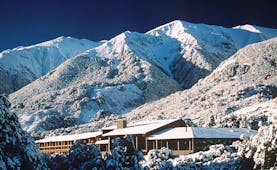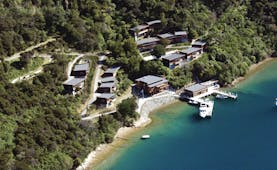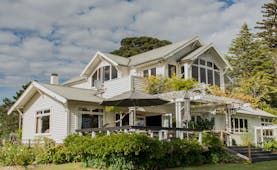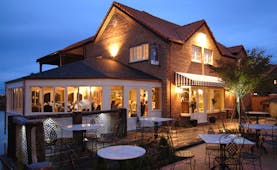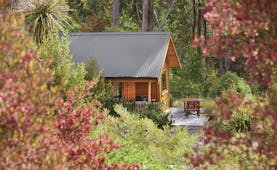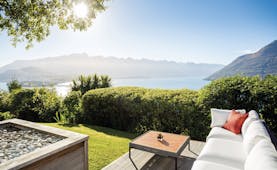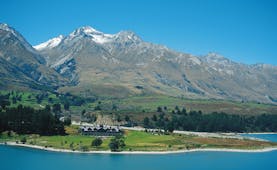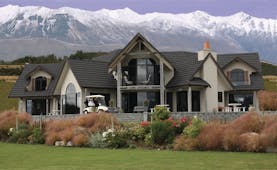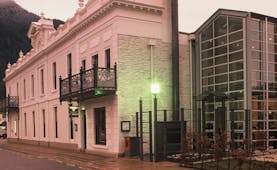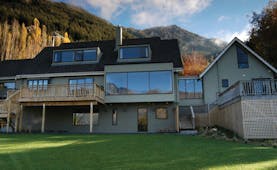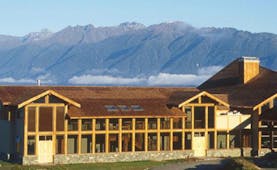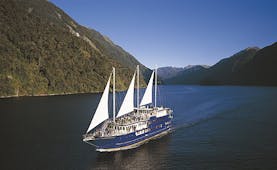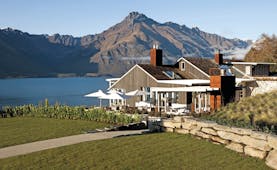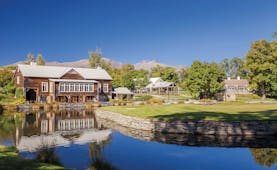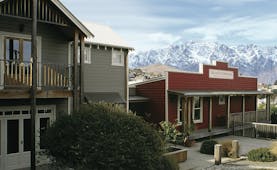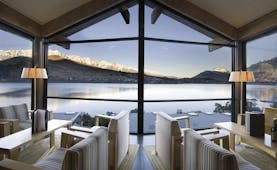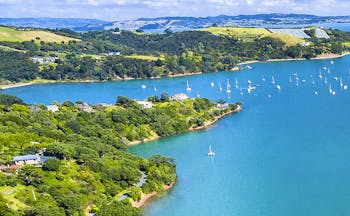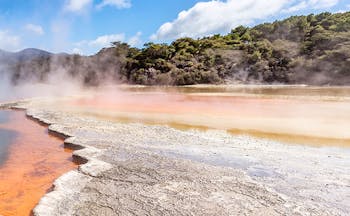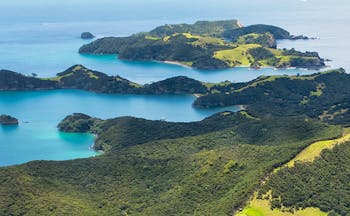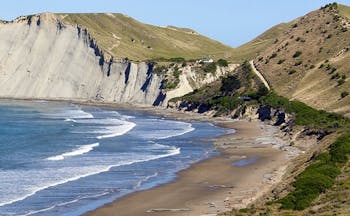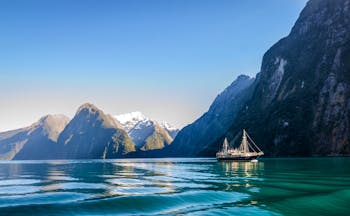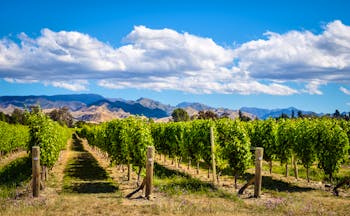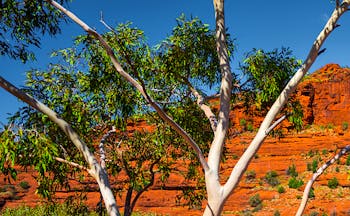Luxury tailormade touring holiday of New Zealand's North Island from Auckland and the Bay of Islands, ending in Wellington
This 12-night touring holiday offering the best of New Zealand’s North Island starts in the vibrant sea-facing city of Auckland and will then take you north through a rugged and lush pacific coastline, bursting with iconic fern trees, into the paradise tropical beaches of the Bay of Islands. Next you will enter the volcanic plateau of Rotorua. Stop here for incredible geothermal displays, lush rainforest, and a taste of true Maori culture, before continuing onto Taupo where a majestic lake and the Tongariro National Park await. Having sailed or hiked through this unique region, continue East to find the rolling green hills, orchards, vineyards and sparkling coastline of Hawke’s Bay, and the art deco architecture of Napier. Finally, journey south to The Wairarapa in search of the renowned vineyards of Martinborough, a spectacular coastline in Cape Palliser, and iconic pastoral New Zealand, before concluding your tour in the capital city Wellington.
Highlights
Auckland • Mount Eden • Waiheke Island • Piha • Bay of Islands • Rotorua • Te Puia • Pohutu Geyser • Whirinaki Forest • Tongariro National Park • Hawke’s Bay • Napier • The Wairarapa • Martinborough vineyards • Wellington
Day by day
Arrive in Auckland and settle into the time-zone, and your luxury accommodation. Soak up the sights and sounds of the iconic city of Auckland. For the best of the views, visit the 328-meter Sky Tower, or otherwise hike up Mount Eden, a volcanic peak that casts views over the Hauraki Gulf, Auckland, and the iconic Eden Park – home of the All Blacks. For a different sense of perspective, you could choose to sail in the gloriously protected water of the bay on a real America’s Cup Yacht. With the wind ruffling your hair, and the skyline of Auckland as a backdrop, this is a fantastic way to introduce yourself with what a holiday in New Zealand is all about.
Today could be spent living as a true New Zealander by journeying to one of the classic city escapes from Auckland. To the east lie the Hauraki Gulf Islands, and the largest, Waiheke Island, offers something for everyone, with both beautiful beaches, fashionable streets and some excellent vineyards. Take a stroll on one of island’s trails which take you from cliff top vistas into the cool and dense envelope of the native forest. To the west, volcanic beaches and great surfing await in Piha, a fantastic climax to an easy day’s road trip.
Picking up your 4x4 hire car, your first taste of rural New Zealand awaits. Today you drive north through the lush vegetation, spectacular coastline, orchards of citrus trees and roadside fruit stalls, bumpy volcanic peaks, and, of course, pastures of sheep. Arrive in the Bay of Islands to find your spectacular panoramic accommodation perfectly positioned to make the most of the evening sunshine. Spotting dolphins playing in the ocean below you whilst unwinding on your private deck or in a jacuzzi, sundowner in hand.
A stay in the Bay of Islands really is about exploring the idyllic coastline that surrounds you. Lush fern filled valleys turn to cliffs, bays, inlets and beaches, and into the crystal-clear waters of the Southern Pacific. Choose from a range of activities including sea kayaking, swimming with the resident dolphins, or sailing. Land lovers may choose to admire the vistas on horseback, or by hiking. Otherwise, simply get onto the beaches and soak up the Southern Hemisphere sunshine.
Driving to Kerikeri Airport in the Bay of Islands, you will drop your hire car and board your flight to Rotorua. This flight will take you deep into the volcanic heartland of the North Island, where geothermal wonders, bubbling hot pools, exploding geysers, and lush rainforest. Pick up your new hire car, and perhaps join an evening Maori cultural display in a local Maori village. Rotorua is often considered the heart of Maori culture in New Zealand, so there is no better place to learn of their historic traditions and watch fascinating song and dance before settling down to an authentic feast cooked beneath the ground on hot stones.
Today would be best spent uncovering the geothermal wonders of the region. To do so, visit Te Puia – a 70-hectare park that contains the world famous Pohutu geyser, as well as mud pools, hot springs and silica formation. Indeed, here you will also find the Kiwi bird, and national schools of Maori wood carving, weaving, stone and bone carving. The highlight of the experience is undoubtedly Pohutu geyser, an ancient geothermal feature, and the largest active geyser in the southern hemisphere. She erupts twice every hour and sometimes reaches heights of 30 metres. Next, travel to Whirinaki forest, where lush rainforest supports a great diversity of wildlife including many rare birds. A network of trails makes walking and mountain biking a joy amongst the awe-inspiring trees.
A short and easy drive South will take you past yet more steaming geothermal sites before arriving at the pretty shores of the majestic Lake Taupo. Here, you could enjoy an afternoon sail to the ancient Maori rock carvings on a beautiful yacht and marvel at the scale of the mountain fringed Lake. For those feeling a bit more active, head out on the Tongariro Crossing in the Tongariro National Park. This volcanic hike casts incredible views over the Central North Island, and hikers can even scale ‘Mount Doom’ from the Lord of the Rings trilogy. It’s a tough hike, but absolutely worth the views from the top.
Meander South East through the forested hills of Kaimanawa and Kaweka before reaching the art deco treasures of Napier and the fertile and sunny plains of Hawke’s Bay. This afternoon could be rightly spent exploring the architectural treasures of Napier, which was rebuilt in a striking art deco design following a catastrophic earthquake in the 1930s. Also of interest would be to pay visit to Napier’s aquarium and dolphin displays, or pop to the pretty village of Havelock North.
Having appreciated architecture and villages yesterday, turn your attention to the highlights of Hawke’s Bay today: its wine, food and landscape. The best way to do this would be through a self-tour of some of the wineries in the region, which could be done by car or by bicycle on one of three Hawke’s Bay Trails. Many of these wineries offer fantastic restaurants and al-fresco dining, or for an alternative stop for lunch at Sileni or Black Barn. In the afternoon, take a scenic drive along the Tukituki River. The rolling green hills will charm as they contrast romantically with sparkling blue of the Pacific Coastline.
Follow the wild and green line of the mountainous Ruahine and Tararua Forest parks, stopping in Greytown for a quick rest and a stroll around the stunning architecture, before arriving in Martinborough for lunchtime. Famous for its stunning pastoral scenery, and its rich pinot noir wines, take your time to drink in the best of the landscape before exploring the pleasant town centre. Many of the best vineyards of Wairarapa are walkable from Martinborough and present a very pleasant way to while away a sunny afternoon. Alternatively, experience true Kiwi life by visiting one of the many working sheep farms in the area.
New Zealand’s capital, Wellington, is located on a picturesque harbour at the southern tip of the North Island. The city prides itself as a centre for culture and the arts and has a plethora of restaurants, cafes, nightlife and activities, as well as being home to the country’s parliament and national treasures. Enjoy a leisurely final day in New Zealand perhaps learning about this magical country at the Museum of New Zealand Te Papa Tongarewa. Alternatively, head South West to the superb Zealandia, where you can come face to face with the elusive symbol of New Zealand – the Kiwi!
With memories to last a lifetime, drop your hire car at Wellington Airport and catch your flight home.
I enjoyed every minute of the tour. Cindy-Marie was simply fantastic and her knowledge, kindness and humour was all that I could have asked for. This was a first class experience. Thank you for making it all happen.Customer on Tuscan wine tour, June 2022
Holiday price guide From about £3,900 per person based on two people sharing a double room and including for economy flights from London.
Holiday Code NZSG01
Call us on 01392 441245
Luxury tailormade touring holiday of New Zealand's North Island from Auckland and the Bay of Islands, ending in Wellington
Arrive in Auckland and settle into the time-zone, and your luxury accommodation. Soak up the sights and sounds of the iconic city of Auckland. For the best of the views, visit the 328-meter Sky Tower, or otherwise hike up Mount Eden, a volcanic peak that casts views over the Hauraki Gulf, Auckland, and the iconic Eden Park – home of the All Blacks. For a different sense of perspective, you could choose to sail in the gloriously protected water of the bay on a real America’s Cup Yacht. With the wind ruffling your hair, and the skyline of Auckland as a backdrop, this is a fantastic way to introduce yourself with what a holiday in New Zealand is all about.
Today could be spent living as a true New Zealander by journeying to one of the classic city escapes from Auckland. To the east lie the Hauraki Gulf Islands, and the largest, Waiheke Island, offers something for everyone, with both beautiful beaches, fashionable streets and some excellent vineyards. Take a stroll on one of island’s trails which take you from cliff top vistas into the cool and dense envelope of the native forest. To the west, volcanic beaches and great surfing await in Piha, a fantastic climax to an easy day’s road trip.
Picking up your 4x4 hire car, your first taste of rural New Zealand awaits. Today you drive north through the lush vegetation, spectacular coastline, orchards of citrus trees and roadside fruit stalls, bumpy volcanic peaks, and, of course, pastures of sheep. Arrive in the Bay of Islands to find your spectacular panoramic accommodation perfectly positioned to make the most of the evening sunshine. Spotting dolphins playing in the ocean below you whilst unwinding on your private deck or in a jacuzzi, sundowner in hand.
A stay in the Bay of Islands really is about exploring the idyllic coastline that surrounds you. Lush fern filled valleys turn to cliffs, bays, inlets and beaches, and into the crystal-clear waters of the Southern Pacific. Choose from a range of activities including sea kayaking, swimming with the resident dolphins, or sailing. Land lovers may choose to admire the vistas on horseback, or by hiking. Otherwise, simply get onto the beaches and soak up the Southern Hemisphere sunshine.
Driving to Kerikeri Airport in the Bay of Islands, you will drop your hire car and board your flight to Rotorua. This flight will take you deep into the volcanic heartland of the North Island, where geothermal wonders, bubbling hot pools, exploding geysers, and lush rainforest. Pick up your new hire car, and perhaps join an evening Maori cultural display in a local Maori village. Rotorua is often considered the heart of Maori culture in New Zealand, so there is no better place to learn of their historic traditions and watch fascinating song and dance before settling down to an authentic feast cooked beneath the ground on hot stones.
Today would be best spent uncovering the geothermal wonders of the region. To do so, visit Te Puia – a 70-hectare park that contains the world famous Pohutu geyser, as well as mud pools, hot springs and silica formation. Indeed, here you will also find the Kiwi bird, and national schools of Maori wood carving, weaving, stone and bone carving. The highlight of the experience is undoubtedly Pohutu geyser, an ancient geothermal feature, and the largest active geyser in the southern hemisphere. She erupts twice every hour and sometimes reaches heights of 30 metres. Next, travel to Whirinaki forest, where lush rainforest supports a great diversity of wildlife including many rare birds. A network of trails makes walking and mountain biking a joy amongst the awe-inspiring trees.
A short and easy drive South will take you past yet more steaming geothermal sites before arriving at the pretty shores of the majestic Lake Taupo. Here, you could enjoy an afternoon sail to the ancient Maori rock carvings on a beautiful yacht and marvel at the scale of the mountain fringed Lake. For those feeling a bit more active, head out on the Tongariro Crossing in the Tongariro National Park. This volcanic hike casts incredible views over the Central North Island, and hikers can even scale ‘Mount Doom’ from the Lord of the Rings trilogy. It’s a tough hike, but absolutely worth the views from the top.
Meander South East through the forested hills of Kaimanawa and Kaweka before reaching the art deco treasures of Napier and the fertile and sunny plains of Hawke’s Bay. This afternoon could be rightly spent exploring the architectural treasures of Napier, which was rebuilt in a striking art deco design following a catastrophic earthquake in the 1930s. Also of interest would be to pay visit to Napier’s aquarium and dolphin displays, or pop to the pretty village of Havelock North.
Having appreciated architecture and villages yesterday, turn your attention to the highlights of Hawke’s Bay today: its wine, food and landscape. The best way to do this would be through a self-tour of some of the wineries in the region, which could be done by car or by bicycle on one of three Hawke’s Bay Trails. Many of these wineries offer fantastic restaurants and al-fresco dining, or for an alternative stop for lunch at Sileni or Black Barn. In the afternoon, take a scenic drive along the Tukituki River. The rolling green hills will charm as they contrast romantically with sparkling blue of the Pacific Coastline.
Follow the wild and green line of the mountainous Ruahine and Tararua Forest parks, stopping in Greytown for a quick rest and a stroll around the stunning architecture, before arriving in Martinborough for lunchtime. Famous for its stunning pastoral scenery, and its rich pinot noir wines, take your time to drink in the best of the landscape before exploring the pleasant town centre. Many of the best vineyards of Wairarapa are walkable from Martinborough and present a very pleasant way to while away a sunny afternoon. Alternatively, experience true Kiwi life by visiting one of the many working sheep farms in the area.
New Zealand’s capital, Wellington, is located on a picturesque harbour at the southern tip of the North Island. The city prides itself as a centre for culture and the arts and has a plethora of restaurants, cafes, nightlife and activities, as well as being home to the country’s parliament and national treasures. Enjoy a leisurely final day in New Zealand perhaps learning about this magical country at the Museum of New Zealand Te Papa Tongarewa. Alternatively, head South West to the superb Zealandia, where you can come face to face with the elusive symbol of New Zealand – the Kiwi!
With memories to last a lifetime, drop your hire car at Wellington Airport and catch your flight home.
I enjoyed every minute of the tour. Cindy-Marie was simply fantastic and her knowledge, kindness and humour was all that I could have asked for. This was a first class experience. Thank you for making it all happen.Customer on Tuscan wine tour, June 2022
Holiday price guide From about £3,900 per person based on two people sharing a double room and including for economy flights from London.
Holiday Code NZSG01
Our prices include
● Return scheduled flights with British Airways, Qantas, Air New Zealand or Emirates from London to Auckland, returning from Wellington to London in economy class.
● Car hire where specified in our itinerary
● 2 nights’ bed and breakfast in Auckland
● 2 nights’ bed and breakfast in the Bay of Islands
● 3 nights’ bed and breakfast in Rotorua
● 2 nights’ bed and breakfast in Hawke’s Bay
● 2 nights’ bed and breakfast in the Wairarapa
● 1 night’s bed and breakfast in Wellington
● The meals included with your tour will vary by chosen accommodation. Please see our hotel suggestions for included board basis.
● Concierge service and Expressions Holidays regional helpful hints
Our prices do not include
● Early check-in or late check-out at any hotels (although we can arrange this on request at additional cost)
● Any other services not mentioned above, such as transfers and meals except as specified in our hotel suggestions
● Personal holiday insurance. This is essential and cover should be in place from when you book the holiday.
● Local tourist tax, payable locally to the hotel
● Optional tours and activities within each location, except where explicitly specified as included in our itinerary, or by hotels in our hotel lists.
● Visa and Passport. You will need a full British passport with at least six months validity. To do not need a Visa for travel to New Zealand as a British Passport will allow the holder a six month stay upon arrival. More details are available from https://www.newzealand.com/uk/visas-and-immigration/
Call us on 01392 441245
Luxury tailormade touring holiday of New Zealand's North Island from Auckland and the Bay of Islands, ending in Wellington
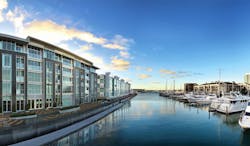
Sofitel Auckland Viaduct Harbour is a 5-star hotel in an excellent waterfront location. Gourmet cuisine, excellent spa facilities and an unmissable afternoon tea offer guests a luxurious haven from which to explore Auckland.
Superior room
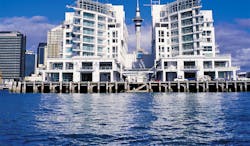
The Hilton Hotel in Auckland is a stylish and modern hotel in an excellent city centre location. Delicious cuisine and excellent quayside views make this an ideal place to recuperate after a day enjoying the sights.
Deluxe Harbour View room
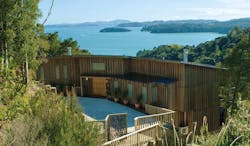
The Sanctuary at Bay of Islands provides an exclusive and romantic retreat in a beautiful natural location. Each guestroom offers supremely comfortable accommodation and sublime views, and guests will adore the fantastic spa, wholesome cuisine and homely atmosphere.
Sea and Bush View suite

Eagles Nest is an exclusive 5-star hotel in an exceptional natural location. Superb cuisine and spa facilities and stunning luxury features, including private pools for most villas, afford guests a truly relaxing and restorative retreat.
First Light Temple
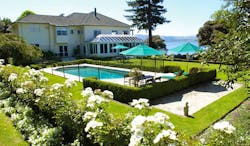
Black Swan is an exclusive, 5-star family-run hotel in a stunning lakeside location. The excellent spa facilities and secluded setting afford guests an idyllic and indulgent experience.
Lake View room
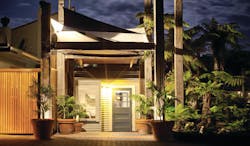
Solitaire Lodge is an exclusive property in a stunning lakeside location, offering panoramic views from each of its luxurious suites. With delicious cuisine, homely comfort and a fantastic touring infrastructure, it is a wonderfully indulgent way to enjoy the area.
Executive suite

The Hilton Lake Taupo is a historic gem of a hotel in an excellent natural location. Delicious cuisine and spectacular views of the lake and mountains afford guests a truly relaxing and indulgent retreat.
Junior suite
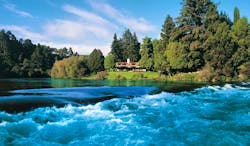
Huka Lodge is an exclusive 5-star hotel in a stunning natural location. Luxurious, traditional accommodation and pristine grounds and gardens afford guests a truly serene and indulgent experience.
Junior Lodge suite
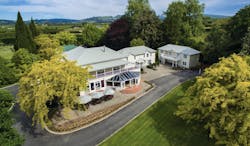
Mangapapa Hotel in Hawke's Bay is an elegant and sophisticated mansion for luxury stays within the culinary and wine highlight of North Island New Zealand with traditional kiwi architecture, peaceful gardens, and a spectacular location for exploring Hawke's Bay.
Homestead Junior suite
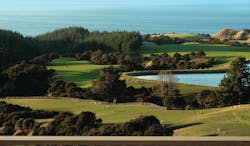
The Farm at Cape Kidnappers is an exclusive, secluded rural retreat with luxurious accommodation and breath taking views. An outstanding clifftop golf course, intimate spa facilities and a wealth of activities afford guests a luxurious adventure.
Hilltop suite

The Martinborough Hotel is an exclusive historic hotel full of character and charm, in an excellent location in the heart of an excellent wine growing region. Cosy and comfortable accommodation and delicious cuisine afford guests a relaxing and restorative experience.
Superior Garden suite

The InterContinental in Wellington is a large, 5-star hotel with excellent facilities, in a good central location. Award-winning cuisine and excellent spa facilities alongside supremely comfortable accommodation make this an excellent base from which to explore the city.
Deluxe room
I enjoyed every minute of the tour. Cindy-Marie was simply fantastic and her knowledge, kindness and humour was all that I could have asked for. This was a first class experience. Thank you for making it all happen.Customer on Tuscan wine tour, June 2022
Holiday price guide From about £3,900 per person based on two people sharing a double room and including for economy flights from London.
Holiday Code NZSG01
Call us on 01392 441245
Luxury tailormade touring holiday of New Zealand's North Island from Auckland and the Bay of Islands, ending in Wellington
About Auckland and environs
An Expressions tailor-made holiday to Auckland sets the tone of a trip to New Zealand in many ways; you see an expanse of water and shades of green of volcanic hilly peaks and open grassy fields. The vista is unashamedly attractive; eye-catchingly pretty and incredibly welcoming. Auckland is New Zealand’s largest and fastest-growing city. It has a feel that is at once historic with its houses of timber weatherboard, corrugated iron rooves, gables, bays and decorative fretwork yet also forward-looking with striking modern architecture, the redeveloped waterfront and the 328-metre-high Sky Tower. Above all, Auckland is a city on the water. Dominated by Waitemata Harbour, Auckland probably has the most pleasure boats per capita of any city in the world. Sailing is perfect with safe harbours, nearby islands to visit and a temperate climate. Just across the harbour are the Hauraki Gulf Islands, some of the most idyllic islands in the world, either as perfect recreational spots for people or as protected sanctuaries for rare birds and native trees and plants. Waiheke Island is one of the largest and whilst people do commute the 30 minutes or so by ferry to Auckland, it is also a beautiful holiday spot with its white sand beaches and coves, vineyards and olive groves. Not far from Auckland are surf beaches on the western coast, Orewa’s 2-mile sandy beach forty minutes’ away, vineyards at Henderson about an hour away and fruit and vegetables at Kumeu.
Highlights of Auckland
Visit New Zealand National Maritime Museum, Enjoy an al fresco dinner at the Viaduct Basin, Take a ferry over to Waiheke Island and have lunch at a vineyard, Drive along Tamaki Drive to Kelly Tarlton’s Underwater World and Antarctic Encounter for sharks and penguins, Visit the west coast surf beaches at Piha, Take the ferry to Victorian Devonport across Waitemata Harbour.
Call us on 01392 441245
Luxury tailormade touring holiday of New Zealand's North Island from Auckland and the Bay of Islands, ending in Wellington
About Central North Island
An Expressions tailor-made holiday to the Central North Island in New Zealand encompasses the volcanic heartland of New Zealand's North Island and contains the geothermal wonders of Rotorua including the dramatic Pohutu Geyser as well as the active volcano, White Island, just off the coast, Mount Ruapehu and the Taupo volcanic zone. The geothermal activity in the area has created a fascinating landscape of volcanic peaks, sometimes snow-capped, mountain ranges, bubbling springs and hot mineral pools, plateaux dotted with vast lakes fed by fast flowing, clear rivers brimming with trout. The landscape is incredibly green, and a mixture of bush with dense forests of beech trees, rimu and other pine trees and ferns of varying sizes and grassy open hillsides with cabbage trees. Every now and then steam rises from patches of ground. This region is also rich in Maori history and Rotorua has remained an important centre for Maori culture. To the east of the region near Gisborne, there are vineyards, rich pastures and surf beaches. It is also the place where Captain Cook made his first New Zealand landfall at Kaiti Beach in 1769. The region offers a superb range of water based and land sports including fishing, white-water rafting, walking, kayaking and mountain biking. Scenic flights over the volcanoes are very popular.
Highlights of the Central North Island
Enjoy the mineral waters at the Polynesian Spa in Rotorua, Visit the Whakarewarewa Thermal area at Rotorua with its mud pools, Pohutu geyser and six other geysers, Maori carving school and meeting houses, Combine a visit to the Blue Lake with its beach and the buried village of Te Wairoa, Visit the Waiotapu Thermal Wonderland between Rotorua and Taupo with the Lady Knox geyser (shoots water and steam up to 21 metres at 10.15 am daily) and walk through the geothermal area past the Champagne Pool and Primrose Terraces, Keen fishermen should try the trout fishing at Lake Taupo.
Call us on 01392 441245
Luxury tailormade touring holiday of New Zealand's North Island from Auckland and the Bay of Islands, ending in Wellington
About Northland and Bay of Islands
An Expressions tailor-made holiday to Northland and the Bay of Islands is an opportunity to explre a region of rich pastures, rolling farmland, forests of gigantic kauri trees that can be up to 2000 years old, lush fern filled valleys, cliffs, bays, inlets and miles of sandy beaches and a scattering of islands offshore. From Auckland to the very northern tip of the country, Northland stretches between the Pacific Ocean and the Tasman Sea in a splendour of outstanding natural beauty and sites of historic significance. The climate is sub-tropical, and a diversity of plants thrive; from silver fern to vines, from the pohutukawa tree with its crimson flowers to manuka, plus an array of fruit and vegetables including avocadoes, figs and oranges. In addition to the beautiful scenery and welcoming climate, Northland has numerous sites of historic significance as the region where Europeans and Maoris first came into contact. Russell, Pahia, Waitangi and Kerikeri are all interesting places to visit. Local arts and crafts including plaited flaxen baskets, carved wood and greenstone and pottery flourish in the region. The area is strong on leisure activities, many associated with the water such as fishing, kayaking, diving and sailing but also scenic flights, horse trekking and tramping.
Highlights of Northland and the Bay of Islands
If a diver, dive the Rainbow Warrier site or in the marine reserve at Poor Knights Island, Take the car ferry from Opua to Okiato and drive to Russell, Drive along the stunning coast from Whangaroa to Matauri Bay passing the Cavalli Islands offshore, Swim with dolphins in the Bay of Islands, Walk and tramp through the Bay of Islands Maritime and Historic Park, Visit the Waitangi National Reserve with the Treaty House and Maori war canoe.
Call us on 01392 441245
Luxury tailormade touring holiday of New Zealand's North Island from Auckland and the Bay of Islands, ending in Wellington
About Wairarapa
An Expressions tailor-made holiday to Wairarapa is the chance to witness one of New Zealand’s rural gems. New Zealand's Wairarapa region stretches from the Rimutaka Range east of Wellington further eastwards to the Pacific coast and includes some of the most remote coastal areas of the North Island but within what is primarily a sheep-raising district of grassy hills bordered by the pine-clad distant Tararua mountains, there are the low-lying vineyards of Martinborough, producing excellent pinot noir, Cape Palliser with its seal colony, and the historic town of Greytown. One of the most stunning aspects of the scope of the country is had as you drive to Wharekauhau along the shores of Lake Wairarapa and then climb the cliffs near the sea – the land is vast and open, a meeting point of dramatic coast and rolling fields.
Highlights of Wairarapa
Visit the Museum of New Zealand Te Papa Tongarewa in Wellington, Stop off in Greytown with it antique shops, restaurants and Victorian architecture, Visit Martinborough for its atmosphere and about 26 wineries, Stop off at Mount Bruce National wildlife centre if driving from Hawke’s Bay towards Wellington and visit the aviaries that hold some of the country’s rarest species of birds and reptiles such as the tuatara, Drive along the coast to Cape Palliser with its seal colony passing the fishing village of Ngawi.
Call us on 01392 441245
Luxury tailormade touring holiday of New Zealand's North Island from Auckland and the Bay of Islands, ending in Wellington
About Wellington
An Expressions tailor-made holiday to Wellington adds a taste of the cosmopolitan and diverse side of the country. Wellington, New Zealand’s capital, is located on a picturesque harbour at the southern tip of the North Island. The city prides itself as a centre for culture and the arts and has a plethora of restaurants, cafes, nightlife and activities, as well as being home to the country’s parliament and national treasures. The city is nicknames ‘Windy Wellington’ and you don’t need to spend too long there to understand why.
Highlights of Wellington
A highlight of a visit to Wellington is undoubtedly Te Papa, the Museum of New Zealand. This striking building dominates Wellington’s waterfront and has gained widespread acclaim for its innovation and approachability since opening in 1998. The museum has become the country’s pride and joy and is affectionately called ‘Our Place’ as it celebrates the essence of New Zealand and its people. Among Te Papa’s treasures is an extensive Maori collection and its own marae. Natural history, the environment, European settlement and many other things New Zealand are presented in impressive gallery spaces with a touch of interactive high tech. There are also changing exhibits of international art. A number of hands-on discovery centres can be found here, designed for children, as well as a shop, cafes, an upmarket restaurant and an auditorium – so make sure you allow ample time to explore. Another cultural highlight is the City Gallery which features various changing exhibits and has a reputation for challenging and innovative displays.
Cultural highlights of Wellington
Other sights to see in the city of Wellington include the tranquil 26-hectare Botanic Gardens (tel: 04 499 1400. Open sunrise to sunset), which are easily visited in conjunction with the cable car ride (see below). The large gardens contain native bush and other gardens, including the Lady Norwood Rose Garden, which has over 100 rose species. There is also a teahouse, visitors centre and the New Zealand headquarters of the World Wide Fund for Nature, with information and displays. You can access the gardens from the Glenmore St entrance. The Cable Car is a Wellington icon and a ‘must-do’ attraction. Running from an arcade off Lambton Quay, it runs up the hillside to Kelburn, overlooking the city. The service began in 1902 and the small, well-presented Cable Car Museum as the top terminus gives information on its history. Mount Victoria Lookout View panoramic sights of the city from the top of Mt Victoria, watch the Cook Strait ferries sail into the harbour and the planes go in and out of the airport. Just minutes from downtown Wellington but worlds apart – Karori Sanctuary, set around a picturesque reservoir, is a living ecosystem home to some of New Zealand’s most rare and extraordinary wildlife. The Sanctuary includes a fascinating indoors exhibition with big-screen movie and a selection of outdoor walks through beautiful native bush spotting species such as kākā - the playful forest parrot, tuatara – a relic from the time of the dinosaurs, takahē – only around 250 left today, saddleback, hihi, geckos and many more. Karori Sanctuary has activities for young and old and can keep you entertained anywhere from 2 hours to a whole day. Visit the Carter Observatory and take a virtual journey through space in Carter's new planetarium - a state-of-the-art full-dome digital theatre, then take your own steps through space as you walk through the world-class interactive multimedia space experience. Discover our Universe, along with some of New Zealand's most prestigious telescopes and astronomical artefacts.

